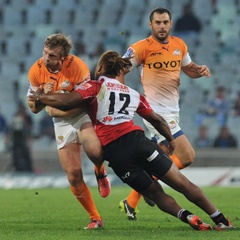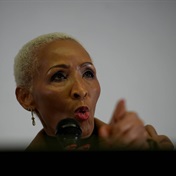
The Sharks’ fall from grace is illustrative of a worrying decline in the standard of South African rugby.
With two rounds to go in this year’s Super Rugby competition, the Sharks and the Cheetahs can no longer qualify for the play-offs.
The Lions and the Bulls might still make it, but are reliant on results in other matches going their way.
That will leave only one local team, the Stormers, as the sole South African side in the last six – for the second consecutive year.
No South African side has won the title since the tournament was reconfigured in 2011 to include 15 teams.
The Springboks won the rugby World Cup in 2007 on the back of producing both finalists in that year’s Super Rugby tournament.
In subsequent years, South Africa dominated the Super 14, with the Bulls winning the championship three times in all.
However, the decline has been marked, most noticeably at the Sharks and the Bulls.
Though there has been a revival at the Lions, the thin-on-resources Cheetahs have struggled.
Even the current flag bearers, the Stormers, don’t compare favourably with the top New Zealand sides.
Critics of the Stormers point out that the men from the Cape have on only eight occasions managed to collect bonus points for scoring four tries or more in five years (80 matches) of the Super 15.
There is something amiss with South Africa’s style of play, level of skills and selection processes and the blame has to be levelled at administrators and coaches.
The Sharks are a case in point, where poor management has had a negative impact on the team’s performance.
The appointment of former Springbok captain John Smit as CEO soon after his playing career ended in April 2013 was touted as visionary but was handled so poorly it engendered resentment.
Smit’s first act was to botch the dismissal of the team’s coach, John Plumtree – the popular Kiwi read about his dismissal in the media.
There was unsubstantiated talk of Smit having a grudge because Plumtree had often preferred Bismarck du Plessis to him.
The Sharks’ next move was to appoint World Cup-winning coach Jake White, which seemed guided by the desire to plug into a formula for success that had previously worked – but it foundered in acrimony.
White’s sudden departure was said to be the result of a clique of senior players, led by the Du Plessis brothers Jannie and Bismarck, who resented his disciplinarian ways.
After a promising start at last year’s Super Rugby competition, the Sharks lost their last two games to blow their chance of topping the log and went down 6-38 in the semifinals to the Crusaders in Christchurch.
The Sharks were then forced to find a new coach and settled on Gary Gold, who had been the Springboks’ assistant coach in the last years of Smit’s captaincy.
Gold had commitments in Japan and was unable to take charge until just before the start of the competition, but it is unlikely he would have been able to stop the rot even if he had arrived earlier.
There had for some time been concerns about a truculent mood in the team and it all came to a head when skipper Bismarck du Plessis and Bok centre François Steyn were handed lengthy bans for foul play.
Smit was also castigated for signing ageing players such as Marco Wentzel from Wasps in England along with Mouritz Botha and Matt Stevens, who had been his team-mates at Saracens.
The Sharks have an impressive board that includes Stephen Saad of Aspen as chairperson, former Cope MP Graham MacKenzie as president and leading businessperson Terry Rosenberg, but this acumen does not seem to have been transferred to running a professional sports team.
There is also great concern in Pretoria, where the Bulls, in spite of being the strongest franchise financially, have fallen well short of the standard their fans expect – the problems starting with an exodus of eight top players in 2013.
South African unions cannot compete with the lucrative contracts proffered by French, British and Japanese clubs, but questions are nevertheless being asked at Loftus about player agreements and coaching protocols that have not moved with the times.
With Allister Coetzee and Naka Drotské leaving the Stormers and the Cheetahs, respectively, there is much interest in what changes the latter’s replacement, former Bok fly half Franco Smith, and the former’s yet-to-be-named successor can bring.
The poor performance in Super Rugby is a bad augury for the World Cup and even more alarming is the thought that, next year, South Africa will have to field an extra team, the Kings, in the new 18-team Super Rugby competition.
How can the SA teams’ Super Rugby performance be improved?
SMS us at 35697 using the keyword SUPERRUGBY and tell us what you think. Please include your name. SMSes cost R1.50




 Publications
Publications
 Partners
Partners








